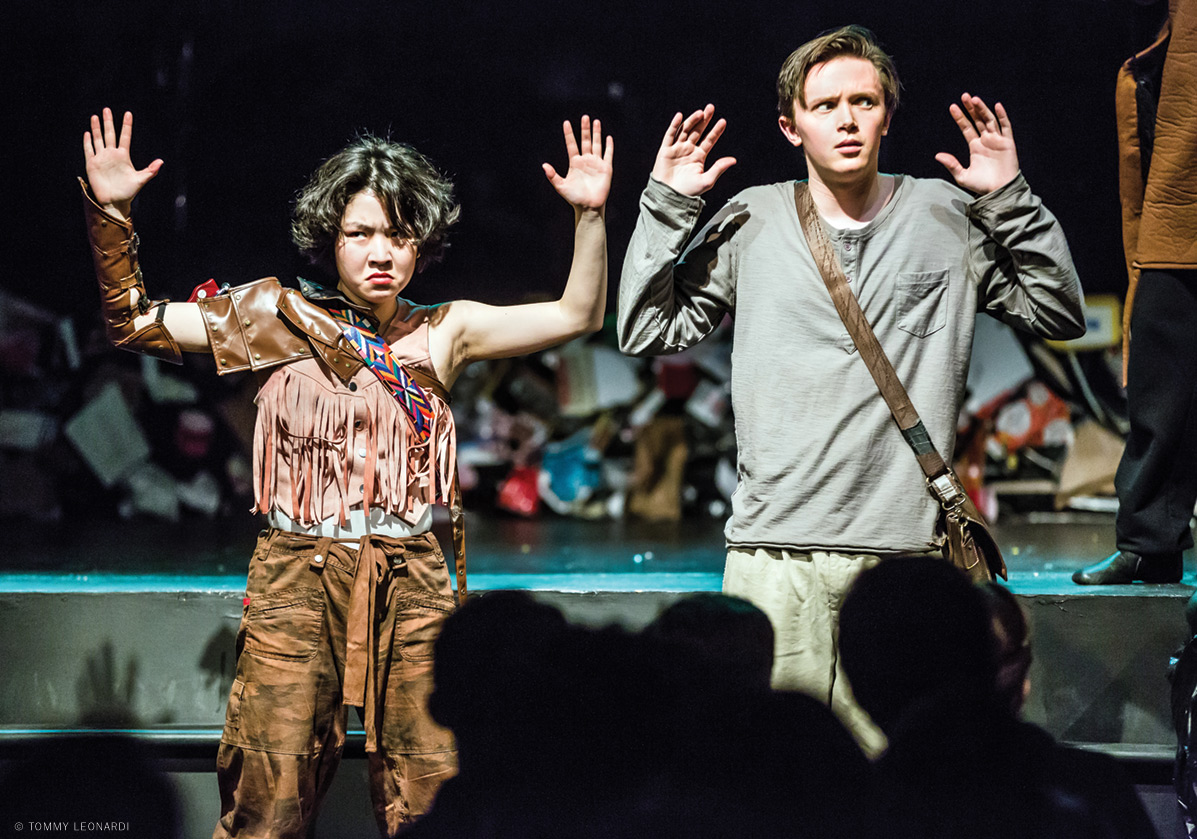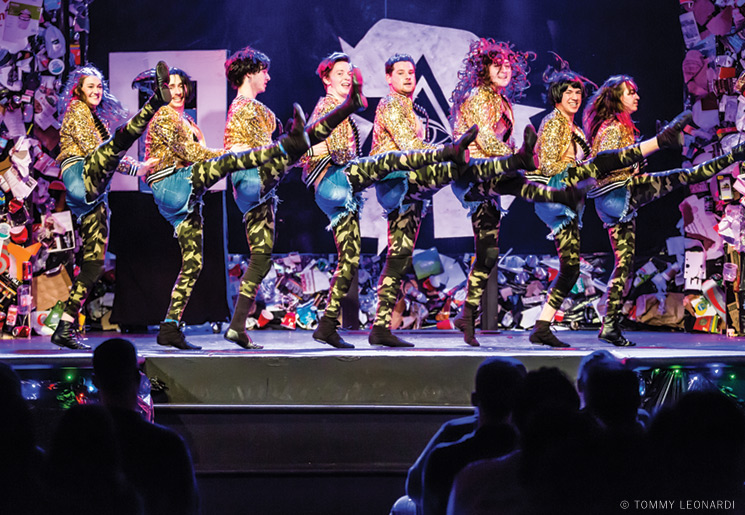
New traditions were made—and longstanding ones maintained—as women took the stage for Mask and Wig’s annual spring production for the first time in the group’s 134-year history.
“I saw them, and I thought, I have to do this.”
So recalled Lauren Cho C’26, who as a high school senior watched the Mask and Wig Club’s show in New York during its 2022 spring tour. A few months earlier, the 134-year-old Penn group that had long billed itself as the country’s “oldest all-male collegiate musical comedy troupe” had decided to include all genders beginning in the fall of 2022 [“Gazetteer,” Jan|Feb 2022]—which conveniently coincided with Cho’s first semester at Penn.
Exactly a year later, Cho was back in that same theater for Mask and Wig’s 2023 spring tour—this time as the club’s first-ever female lead.
Playing the part of “Jane,” an orphaned scavenger traversing a post-apocalyptic pseudo-Philadelphian wasteland, Cho starred in A Doomsday in the Life, Mask and Wig’s 134th annual production, opposite “Max,” played by David McCabe C’23, who also serves as Wig’s cast director. In fact, McCabe had emailed Cho before she got to Penn, because of an interest form she filled out when she saw them on tour. “It’s so surreal to be speaking with him on stage now—it’s incredible,” Cho said, still clad in apocalyptic gear with a ukulele strung across her back, just off the stage after a Saturday matinee performance.
During the opening number of the show—which ran from January 21 to March 31 at Mask and Wig’s historic clubhouse on Quince Street in Center City—all of the non-male cast members stood on one side of the stage and exclaimed wryly, “Women are here now. So keep that in mind.”
It had been a long road to get there—133 years of all-male shows, a vote of the club’s undergraduate and alumni members in September 2021 to eliminate gender as a qualification to create and participate in productions, and, most recently, partnerships with other campus organizations including the Platt Performing Arts House and the Penn Women’s Center to facilitate a smooth switch. “We didn’t want to just rush into this and neglect how incoming members will feel or how existing dynamics will have to change,” said Eli Cohen C’23, the group’s secretary–treasurer. “So there was a lot of preparation that we did beforehand.”

Yet none of the changes felt unnatural or forced, and some were perhaps overdue anyway, according to the club’s undergraduate leaders. For example, alterations were made to the clubhouse dressing rooms for more privacy during quick changes. The group’s notorious kickline was altered, too. Instead of the all-male, drag-clad cabaret kickline to close shows, it’s now a mix of the cast wearing whatever they want. Whoever could keep up with the beat and kick highest made the cut—regardless of gender. “I think everything’s become a lot more flat and less hierarchical this year,” said Matt Weltmann W’23, Wig’s business manager. “We didn’t want a bunch of dudes at the top gatekeeping information and access. I think across all sections, we’ve tried to bring the newer members earlier on into positions of leadership.”
Weltmann admitted that the group’s “biggest fear” was that women might not want to try out. But plenty did, with 13 becoming involved in the spring production across the cast, band, crew, and business staff. Sophie Faircloth C’24 already had male friends in Wig and figured “what’s the worst that could happen?” if she auditioned. Now she’s one of the group’s oldest non-male members. “It has been an extremely welcoming environment for non-male members of the company,” Faircloth said. “We’re encouraged to really put ourselves out there even more, especially in the cast, because we’re changing from this image of old traditions that didn’t benefit anyone to new traditions that we can all enjoy and find funnier.”
The returning Wig members also made sure to include new members—particularly women—in the writing process. Usually, the spring show is written before the fall semester even begins. This year, they made changes to include non-male new members who otherwise would have been excluded.
“We wanted to carve out as many opportunities as possible to get their voices heard, and their input into the script, just so that it’s something that they can feel was representative of them and their class,” Cohen said. In the fall, head writer Charlie Ross C’23 held open writing sessions to ensure that new voices would help shape the spring show. Cho and Faircloth both chose to get really involved in the writing process. “It was a change that was maybe prompted by going gender inclusive, but it’s a good change that should continue,” noted Tom Fanelli EAS’23, Wig’s undergraduate chair and a piano player in the Mask and Wig band. “There’s no reason that our new members shouldn’t have a voice in the script.”
One big question heading into the spring shows was whether the Mask and Wig’s notable tradition of men crossdressing would continue. Ultimately, they felt that it was worth maintaining the group’s cabaret and drag roots—with a twist. Now female cast members can dress as male characters, too. “We decided that there was no reason to gender the roles on stage,” Fanelli says. “Whoever’s the funniest person for that role, they would just play it—whether that’s putting on a wig or dressing up as a man. It doesn’t really matter, as long as that person is excelling in that role and can present it the best on stage.”
In one of the sketches, Faircloth dressed in drag as an inhospitable, misogynistic guy making life miserable for his fellow apocalyptic-bunker mates. “I remember a conversation that I had with one of our alumni,” Faircloth said. “He was like, ‘You are the first woman to go out on stage and do a parody of a man in a Mask and Wig show—you’ve got to make up for the last 134 years!’”
While the club’s leaders are still men, as an upperclassman Faircloth has taken on something of an informal leadership position—in a “motherly-type role for the new members,” she said. Faircloth’s mentorship to younger students has “been so crucial,” Fanelli noted. “You come into this year, as an all-male group, with all-male leadership, and we bring in this class of people who are not all males. Sophie and the other older women bridge that gap.”
“If I hadn’t known that it was exclusively all men in the past, I would have thought it’s always been like this,” said Cho, who’s excited to get more involved with writing as she moves into her sophomore year.
The new-look group bonded even more during Spring Break as they continued Mask and Wig’s annual tour, a tradition that dates to 1891, performing in New York, Boston, and Washington, DC. “These are 50 of the people who I consider to be some of my best friends,” Faircloth said. “The bit never ends in Mask and Wig.”
Fanelli, Cohen, Weltmann, and the other graduating seniors are eager to hand off Wig to a new generation. “I think we’re just really lucky to have people who want it to continue, who cherish going down to the clubhouse on Friday and Saturday nights,” Weltmann said.
“I am excited that this is going to be my home for the next four years,” said Defne Tim C’26, one of Wig’s female newcomers. “And I’m going to grow in it. And I’m going to grow to become a leader.”
—Meg Gladieux C’23 GEd’24




